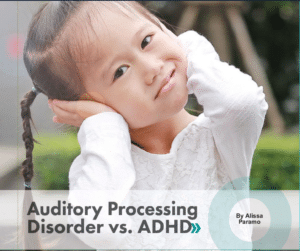By Alissa Paramo
Many disorders share common traits and are often correlated. Because many symptoms of Auditory Processing Disorder overlap with other disorders, children are sometimes misdiagnosed or may have a coexisting condition along with APD. As an example, a child may be diagnosed with ADD (Attention Deficit Disorder), ADHD (Attention Deficit Hyperactivity Disorder), PDD (Pervasive Developmental Delay), Autism Spectrum Disorder, Sensory Processing Disorder, Receptive Language Disorder, or Mixed Expressive-Receptive Language Disorder, because all of these conditions could affect how a child processes spoken information.
Although there is some overlap in symptoms, individuals with Auditory Processing Disorder present primarily with complaints of inability to follow directions and frequent requests for clarification, while individuals with ADHD present primarily with complaints of inattentiveness and/or hyperactivity. Children with ADHD also tend to demonstrate inattention, distractibility, and hyperactivity in any environment, whereas children with Auditory Processing Disorder usually do not have difficulty focusing and paying attention in quiet environments. Some children with APD also have trouble screening out background noise, so they pick up bits of surrounding sounds. The echo in a gymnasium or the hum of the air conditioner in the classroom interferes with the conversation at hand. It is like listening to the radio with interference from other stations distorting the reception. Many children with APD are extremely sensitive to sound. In fact, some sounds can be said to “hurt” — a blender, a train engine, police sirens. You may notice a child plug their ears before the beginning of a movie or before a toilet flushes, this is a learned response to those uncomfortable sounds before they even happen.
While the underlying cause of APD is not fully known. Some experts debate whether heredity or environment — or both — are responsible for the condition. While the human auditory system is fully developed at birth, auditory pathways do not mature until the age of 10 to 12. Because of this, early influences such as poor prenatal nutrition, a mother’s exposure to cigarettes or alcohol, childhood malnutrition, and chronic ear infections — may negatively affect auditory processing. Premature birth, Lyme disease or other brain infections, closed head injury, and exposure to low levels of heavy metals (lead or mercury) may also play a role. So, what’s the good news? The good news is that, because the auditory pathways continue to develop, APD is typically responsive to intervention.
In comparison children with ADHD may be poor listeners and have difficulty understanding or remembering verbal information, however it is the attention deficit that is hindering their ability to access or to use the auditory information that is coming in, not the actual processing of the auditory in the brain. A study conducted at the State University of New York in Fredonia looked at the effects of Ritalin on auditory processing in children with both ADHD and APD. The drug did not improve auditory processing, despite improving children’s performances on a standard test that measured attention and impulsivity.
It is also common for ADHD to coexist with an auditory processing disorder. Studies suggest that 50% of children diagnosed with ADHD may also have APD. While they do have high rates of coexistence, the two need to be addressed by different methods of treatment. While APD is not as well-known as ADHD, it is becoming increasingly common. Roughly 7 percent of children have some type of auditory hypersensitivity or processing difficulty. In a research study by Dr. Jay R. Lucker, Audiologist & Speech-Language Pathologist Specializing in Auditory Processing Disorders & Language Processing Disorders at Howard University, which looked at the number of children evaluated for auditory and language issues related to APD, he found that 39% of children with APD passed all the language tests and failed auditory processing tests. Therefore, a speech-language evaluation cannot rule out the need for an APD evaluation. Many children would be overlooked because the skills assessed are different.
Not all language problems are due to APD, and not all cases of APD lead to language and learning problems. APD is not diagnosed by checking off a list of symptoms. Symptoms also vary based on the age and development of the individual. Most commonly APD looks like sensitivities and difficulties discriminating between sounds for kids around 3-4, for school aged kids APD can start to compromise learning and success in the classroom. APD can be treated from childhood through adolescence which is when the auditory pathways stop developing and even later, although experts agree that the earlier the diagnosis and treatment, the better. As with ADHD, a combination of professional, school, and home therapies is most effective.
By Alissa Paramo, Executive Director of SIRRI AZ. For more information visit sirriaz.com

